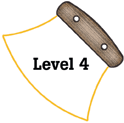
Alaska Science
Key Element C3
 |
Alaska Science |
|
Performance Standard Level 4, Ages 15–18
|
|
|
|
Sample Assessment Ideas
|
Standards Cross-References
|
||
|
National Science Education Standards Progress in science and technology can be affected by social issues and challenges. Funding priorities for specific health problems serve as examples of ways that social issues influence science and technology. (Page 199) Scientists are influenced by the societal, cultural, and personal beliefs and ways of viewing the world. Science is not separate from society but rather science is a part of society. (Page 201) In history, diverse cultures have contributed scientific knowledge and technologic inventions. Modern science began to evolve rapidly in Europe several hundred years ago. During the past two centuries, it has contributed significantly to the industrialization of Western and non-Western cultures. However, other non-European cultures have developed scientific ideas and solved human problems through technology. (Page 201) |
Benchmarks The early Egyptian, Greek, Chinese, Hindu, and Arabic cultures are responsible for many scientific and mathematical ideas and technological inventions. (Page 19) Modern science is based on traditions of thought that came together in Europe about 500 years ago. People from all cultures now contribute to the tradition. (Page 19) Progress in science and invention depends heavily on what else is happening in society, and history often depends on scientific and technological developments. (Page 19) |
|
Table of Contents | Return to Alaska Native Knowledge Network